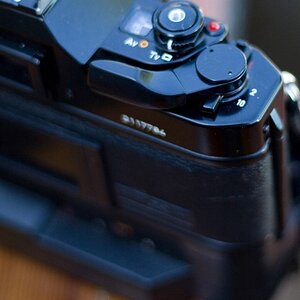scaryloud
TPF Noob!
The current price for the D600 refurb is cheaper than the D300s was new. While some may jump to FX, there are things to consider first.
A lot of DX camera owners have FX lenses in our camera bag. Getting rid of your DX lenses is easy enough, but those FX lenses you currently have may surprise you once slapping them on an FX camera.
I own a D7000 and own the 24-120 f4 FX and 70-300 f4.5-5.6 lens among others and have been spoiled, plain and simple. I borrowed a D600 and went out to try it out and did direct comparisons to my D7000. When I got home, I saw the results... much to my dismay. The sweet spot of the lens my DX camera took advantage of doesn't exist on a FX camera.
Every bit of vignetting, barrel distortion, pincushion, coma, corner softness, etc that may be a FX lenses shortcoming is COMPLETELY evident on a full frame camera. I'm not trying to discourage fellow prospects, just understand this and either be prepared to increase your post processing time or dig deep in your wallet for the highest quality lenses. The choice is yours...provided you can afford it.
A lot of DX camera owners have FX lenses in our camera bag. Getting rid of your DX lenses is easy enough, but those FX lenses you currently have may surprise you once slapping them on an FX camera.
I own a D7000 and own the 24-120 f4 FX and 70-300 f4.5-5.6 lens among others and have been spoiled, plain and simple. I borrowed a D600 and went out to try it out and did direct comparisons to my D7000. When I got home, I saw the results... much to my dismay. The sweet spot of the lens my DX camera took advantage of doesn't exist on a FX camera.
Every bit of vignetting, barrel distortion, pincushion, coma, corner softness, etc that may be a FX lenses shortcoming is COMPLETELY evident on a full frame camera. I'm not trying to discourage fellow prospects, just understand this and either be prepared to increase your post processing time or dig deep in your wallet for the highest quality lenses. The choice is yours...provided you can afford it.



![[No title]](/data/xfmg/thumbnail/41/41906-b9041eb5a3fa48eb5d5084ac2198a75c.jpg?1619739940)





![[No title]](/data/xfmg/thumbnail/32/32177-3a3d923fa1584c6ef7d6602aaa24fbc6.jpg?1619735235)

![[No title]](/data/xfmg/thumbnail/32/32179-99b00fe3df8a5ed7303ced76980128fd.jpg?1619735235)

![[No title]](/data/xfmg/thumbnail/32/32178-010a47bfeb945bdafb02b0ee4888290c.jpg?1619735235)